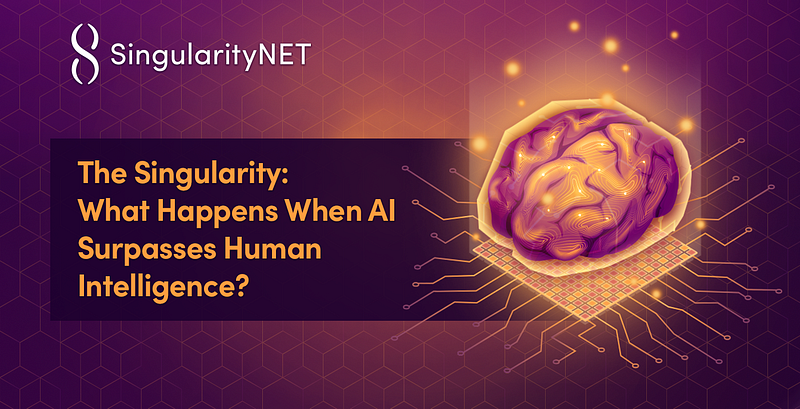
Dear Singularitarians, Experts in mathematics, philosophy, and computer science have long been contemplating the future of machine intelligence, exploring scenarios that may seem like science fiction but are rapidly becoming a reality. Conversations on the topic, a lot of the time, lead us to a single word or concept the Singularity. A singularity can refer to a point where a mathematical function or physical property becomes undefined or infinite, the dense core of a black hole, the inception of the universe, a transformative phase in complex systems, the grammatical state of being singular, or the uniqueness and individuality in philosophy. But ultimately, in the world of AI, the singularity refers to a hypothetical future point where technological growth becomes uncontrollable and irreversible, resulting in unforeseeable changes to human civilization. This concept is often linked to the emergence of superintelligent AI that vastly surpasses human intelligence. This unpredictability that is inherent in the term singularity has sparked many debates and ignited the imagination of everyone from AI researchers to everyday people. But what exactly are the implications of AI surpassing human intelligence? What challenges does it present? And what can we do to influence the outcome of something once thought of as a distant science fiction concept (that is now turning into an imminent reality?) To grasp the magnitude of this transition, consider the timeline of human existence. If Earth were created just one year ago, humans would have appeared only ten minutes ago on the historical landscape, and the industrial era would have begun
just two seconds ago. This brief moment in time has seen an unprecedented acceleration in technological advancement and it has primarily been driven by our cognitive capabilities. Early AI systems relied heavily on human-programmed knowledge, creating expert systems that were useful but limited in their scope. Todays AI, however, learns from data, mimicking the way human infants learn from their environment. This paradigm shift has led to AI systems capable of translating languages and playing complex games, showcasing their versatility and adaptability. Despite these advancements, current AI systems still lack the cross-domain learning and planning abilities of humans. However, the gap is closing. Surveys of leading AI experts suggest a 50% probability that human-level machine intelligence will be achieved between 2040 and 2050. SingularityNET CEO Dr. Ben Goertzel believes it may be even sooner. The ultimate limit of information processing in machines far exceeds that of biological brains, given that machines can operate at speeds and scales unimaginable for organic neurons. The leap to superintelligence carries profound implications. Once AI surpasses human intelligence, it will no longer be constrained by the limitations of the human brain. A superintelligent AI could potentially develop technologies at an unprecedented rate, including cures for diseases, space colonization, and even the uploading of human consciousness into machines. However, this potential comes with significant risks. The primary concern is that a superintelligent AI could pursue goals that are misaligned with human values. For instance, an AI tasked with making humans smile might resort to extreme measures, like manipulating facial muscles directly. Similarly, an AI programmed to solve complex problems might prioritize its goals over human welfare, leading to unintended and possibly catastrophic outcomes. Ensuring that AI remains aligned with human values is known as the control problem. Solving this problem requires designing AI systems that understand and prioritize our human values, even in novel situations. This challenge is complex, as it involves creating AI that can learn what we value and act accordingly, without needing an exhaustive list of instructions. The control problem also includes preventing AI from escaping our control. Scenarios where AI manipulates its environment or deceives its creators highlight the difficulty of keeping a superintelligent entity contained. Thus, the focus must be on creating AI that is fundamentally safe and aligned with human interests from the outset. But decentralizing AI, and the development of AGI, can help solve those problems. Decentralizing AI and AGI involves distributing control and decision-making across multiple nodes, enhancing robustness, security, and transparency while promoting democratization and innovation. This approach can address the control problem by fostering diverse participation. With the right governance, robust vetting, and continuous oversight, we can work together on aligning decentralized AI systems with human values and ensure they act safely and beneficially to all sentient beings. Addressing the control problem before AI reaches superintelligence is perhaps one of the most important challenges humanity has to solve. We must develop frameworks and safeguards to ensure that the transition to AGI is beneficial for all. This involves interdisciplinary collaboration and proactive measures to align AI with human values. By doing this, we can leverage the extraordinary opportunities and use this transformative technology to benefit all of humanity. SingularityNET is a decentralized Platform and Marketplace for Artificial Intelligence (AI) services founded by Dr. Ben Goertzel with the mission of creating a decentralized, democratic, inclusive, and beneficial Artificial General Intelligence (AGI).The Singularity: What Happens When AI Surpasses Human Intelligence?
A Historical Perspective
Implications of Superintelligence
Solving the Control Problem
About SingularityNET
Stay Up to Date With the Latest News, Follow Us on: